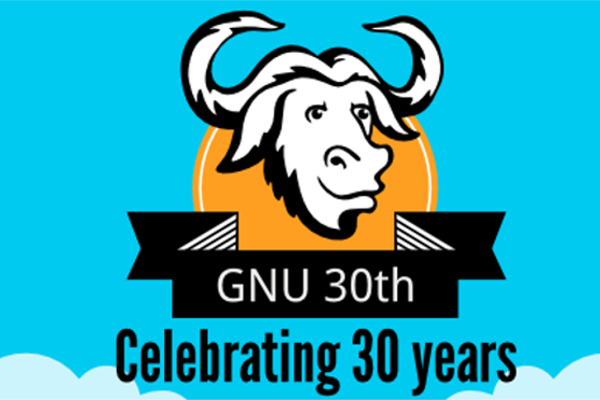

WHEN Linux was born in 1991 its creator, Linus Torvalds, said that it "won't be big and professional like gnu" (GNU had been born and created almost a decade earlier). These days, Torvalds' employer is busy discrediting the role of GNU by altogether omitting it from history. All the attention goes to Linux. LinuxCon coverage was mostly managed or seeded by the well-funded Linux Foundation [1-11]. The Linux Foundation receives a lot more money than the FSF even though GNU is a bigger project than Linux. This is probably related to philosophy. It's not as though Linux and its corporate backers don't use GNU utilities; they do so all the time, but some workers call those utilities "Linux". Misplacing credit is not as innocent as those who refuse to say "GNU/Linux" typically put it.
"It's not as though Linux and its corporate backers don't use GNU utilities; they do so all the time, but some workers call those utilities "Linux"."The Linux Foundation habitually issues reports that are essentially marketing, or PR. This is a vital component of the Linux Foundation's activities (whereas the FSF engages in advocacy). The Linux Foundation says that 10,000 developers contributed to Linux kernel since 2005 [12-18], but it is counting even those who only changed a few lines of code because it helps inflate the numbers and characterise Linux as a massive project worked on actively by thousands of people (full time).
Taking into account the origins of GNU and the large number of GNU packages, it is possible that a lot more -- in terms of developers too -- went into GNU than into Linux. We don't know how many people have worked on GNU, but I recently asked Stallman and we will have some answers soon.
This isn't bashing of Linux, of which there's plenty to be fond and happy about. There are nice event videos and talks coverage to be seen [19-23], but let's put it all in context and remember that not only Linux matters. Without GNU, Linux is just a kernel. ⬆
Related/contextual items from the news:
What it's like at a LinuxCon? Join me in a virtual walk about the North America LinuxCon 2013 in New Orleans.
Linus Torvalds, Greg Kroah-Hartman, Sarah Sharp and Tejun Heo cover what’s happening with the Linux kernel.
This week the LinuxPlanet congregates at the LinuxCon conference in New Orleans and once again it looks to be a memorable event.
Along with a great line up of keynote speakers and breakout sessions, LinuxCon and CloudOpen offer a dizzying array of workshops, mini-summits and work sessions this year. How will you make the most of your time in the Big Easy?
The open-source Xen virtualization hypervisor has undergone a transformation in recent years, revitalizing its community and generating new interest. How did it do it?
Although that rightly notes the incredible pace of development within the kernel, I'd like to highlight something else: the fact that this is taking place in a completely distributed fashion. That's amazing testimony to the skills of the leaders of the Linux project, and to the power of the open source development methodology It's further proof that this approach really is a great way of writing good code, and another reason we should be grateful to the Linux Foundation for producing these reports.
Linux has made the operating system fight into a “two-horse race”, the head of the Linux Foundation told the opening of the annual LinuxCon conference.
It’s “the end of an era” for Microsoft’s Windows, Jim Zemlin, executive director, Linux Foundation told the New Orleans gathering of developers and vendors this morning. Web-based and cloud computing is exploding and making the shift to open source operating systems and software easier.
“Linux is at a tipping point.”
The Linux Foundation has just named its five scholarship winners for 2013, and they’re all over the board, diverse in gender, race, and geography.
Linus Torvalds and Intel developer Sarah Sharp met face-to-face on Wednesday, their first public encounter since their mailing list contretemps over the blunt way Torvalds treats the software coders who work on Linux, the massively popular open source operating system he created and still oversees.
Linus Torvalds and the Linux kernel maintainers on stage today at LinuxCon and CloudOpen covered a range of topics, from personal hobbies to advice for getting patches upstream. But one consistent theme emerged in the discussion: Growing the size and diversity of the Linux kernel developer community -- on the kernel side as well as in user space -- will help push continued innovation even as technology changes.
Getting involved in Linux kernel development is not that hard if you know where to look. That's the message delivered by Linux kernel developer Greg Kroah-Hartman at the Linuxcon conference in New Orleans this week.
"Who Writes Linux" report surfaces new data on how fast the OS is being built, who is writing the code, and what companies are sponsoring the work
“Who Writes Linux” report surfaces new data on how fast the OS is being built, who is writing the code, and what companies are sponsoring the work
The Linux Foundation today released a report called "Linux Kernel Development: How Fast It is Going, Who is Doing It, What They Are Doing and Who is Sponsoring It."
The Linux Foundation held its LinuxCon North America conference in New Orleans this week. This post provides short summaries and links to videos from 12 keynote sessions videos featuring luminaries including Linus Torvalds, Google’s Chris DiBona, Valve’s Gabe Newell, Raspberry Pi’s Eben Upton, and more.
LinuxCon 2013 NA is this week. Here's the keynote from Linux Foundation head Jim Zemlin entitled, "The State of Linux". Enjoy.